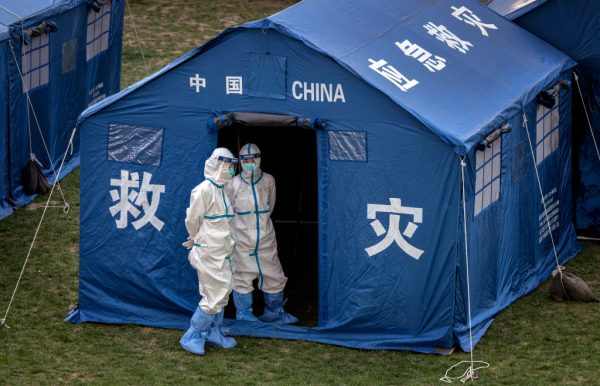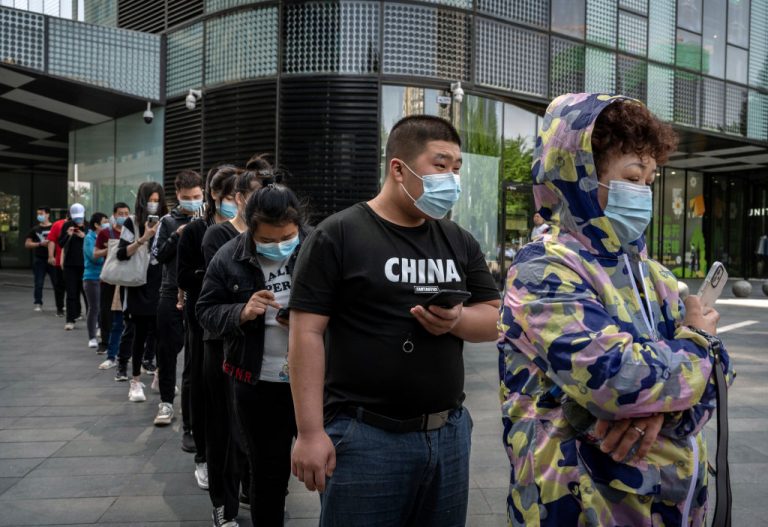As Shanghai remains under heavy restriction, Omicron has spread to Beijing, prompting authorities to mass-test millions and begin lockdowns in China’s capital
Beijing has kicked off mass testing for 3.5 million residents in the bustling district of Chaoyang after 29 new cases were reported over the weekend, bringing the city’s total to 80 — the highest number Beijing has seen since the pandemic first began in the central city of Wuhan over two years ago.
According to a notice issued by the city’s disease prevention team, all residents in Chaoyang began undergoing testing on Monday morning (April 25), in the first of three rounds of screenings to be conducted over a five-day period.
Testing sites were set up overnight at residential complexes and office buildings around Chaoyang district, and long lines of people could be seen snaking around several blocks.
By nighttime, authorities listed 10 additional districts and one economic development zone due for mandatory tests this week — covering a total of 20 million people, of which 16 million are scheduled to be tested today.
Success
You are now signed up for our newsletter
Success
Check your email to complete sign up
Over the weekend, China logged 21,796 new community-transmitted COVID-19 infections, with the vast majority reported as asymptomatic cases in Shanghai. Across the country, many cities and provinces have enforced some degree of lockdown in hopes of quelling further spread of the virus.
READ MORE:
- China’s Leading Health Advisor Criticizes ‘Zero-COVID’ Protocols, Gets Censored
- Shanghai Reverses Decision to Loosen COVID Restrictions Despite Prolonged Suffering and Economic Damage
- Patients Die Waiting Outside Shanghai’s Hospitals as Zero-COVID Lockdown Continues
Panic buying
Following the announcement by health authorities, long lines outside supermarkets and shops were seen despite government assurances that there is sufficient food. Panic buying comes amid fears that Beijing could face a similar situation to Shanghai — where locked down residents were forced to stay home for weeks on end, with some even starving to death as supplies completely ran out.
“I never thought I would go to the supermarket so early in the morning….when I got there, all the eggs and prawns were gone and all the meat was snatched up,” one Weibo user (China’s Twitter-like platform) said.
Another resident in Shanghai said, “Seeing people in Beijing rush to buy food is both funny and distressing… it’s like looking at what my own life was like just last month.”
Other shoppers appeared concerned but not yet panicked. One woman carrying two bags of vegetables, eggs and frozen dumplings, told TRT World that she is buying a little more than usual, just in case. A man said he isn’t worried, but is being cautious since he has a 2-year-old daughter at home.
Another Beijing resident, who lives in Chaoyang and was told on Monday to stay home for 14 days after one neighbor tested positive, said he felt a “little anxious.”
“I’m worried that if we need medicine or other items in the future, we won’t be able to get them delivered,” the resident said, who wished to remain anonymous for fear of reprisal.
Still, residents in Beijing are hopeful that by acting swiftly, they can evade the harrowing fate that people in Shanghai have experienced over the past few weeks.
“I believe our situation will not be as bad … but to be honest, we also bought some rice, noodles, grains and oil,” an HR manager who identified herself as Ms. Zhao said on Weibo. “We’ve made preparations for at least one to two weeks.”
Mass testing to cover most Beijing residents
Beijing health officials announced on April 25 that an additional 29 more cases had been identified in the last 24 hours — raising the city’s total to 80.

Although the caseload is considered relatively low by international standards, authorities there are not taking any chances, especially after seeing how fast the Omicron outbreak in Shanghai spiraled into tens of thousands of new cases within two weeks.
“I think Beijing should be fine,” said Gao Haiyang as he waited in line for a nucleic acid test. “Based on the previous response made by my community, if there’s any emergency, I think supply can be guaranteed. Plus there were lessons we learned from other cities. I think we can make good preparations.”
In addition to the rounds of mass testing, dozens of residential compounds across eight districts have already been placed into lockdown — with residents told they are prohibited from leaving their homes or community grounds — except for emergency situations.
Officials also urged residents not to leave the city unless absolutely necessary, including during an upcoming five-day holiday. The Labor Day holiday, which begins on April 30 this year, has traditionally been a time for mass travel in China.
The city announced today that it will be suspending cultural performances, sports events, exhibitions and other activities that involve large gatherings, as well as all tutoring classes and training sessions until the “current outbreak is brought under control.”














